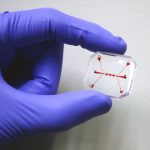 Christopher Hughes (School of Biological Sciences Chair and Professor in Molecular Biology and Biochemistry) has been awarded a National Institutes of Health (NIH) grant to forward his research into three-dimensional (3-D) vascularized micro-organs. These systems model the complex blood vessel structure found in all organs, without the need for large and expensive equipment. The NIH grant, awarded through its National Center for Advancing Translational Sciences’ Tissue Chip for Drug Screening program, is part of the $15M Chips 2.0 program and will support Professor Hughes for two years, with the opportunity to renew for three additional years. The successful completion of his project will yield platforms with the potential to transform drug discovery for diseases of the vascular system.
Christopher Hughes (School of Biological Sciences Chair and Professor in Molecular Biology and Biochemistry) has been awarded a National Institutes of Health (NIH) grant to forward his research into three-dimensional (3-D) vascularized micro-organs. These systems model the complex blood vessel structure found in all organs, without the need for large and expensive equipment. The NIH grant, awarded through its National Center for Advancing Translational Sciences’ Tissue Chip for Drug Screening program, is part of the $15M Chips 2.0 program and will support Professor Hughes for two years, with the opportunity to renew for three additional years. The successful completion of his project will yield platforms with the potential to transform drug discovery for diseases of the vascular system.
Modeling human organs on a small scale (organs-on-chips) has been a major goal of researchers focused on improving the discovery of drug compounds. Professor Hughes and his colleagues have established functional vascularized micro-organs (VMO), and microtumors (VMT), within the 96-well plate system. This unique platform features various tissues that receive their nutrients through living blood vessels, just as they do in the body.
Working with a panel of FDA-approved anti-cancer drugs, Professor Hughes and his colleagues have also demonstrated the potential for anti-cancer drug screening using a human colon cancer VMT model. They found that their platform could accurately identify drugs that target the tumor cells and the blood vessels that supply them. With this new award, he will seek to develop novel vascular microphysiological systems to model various vascular malformations, including those found in the skin, heart, and liver.
